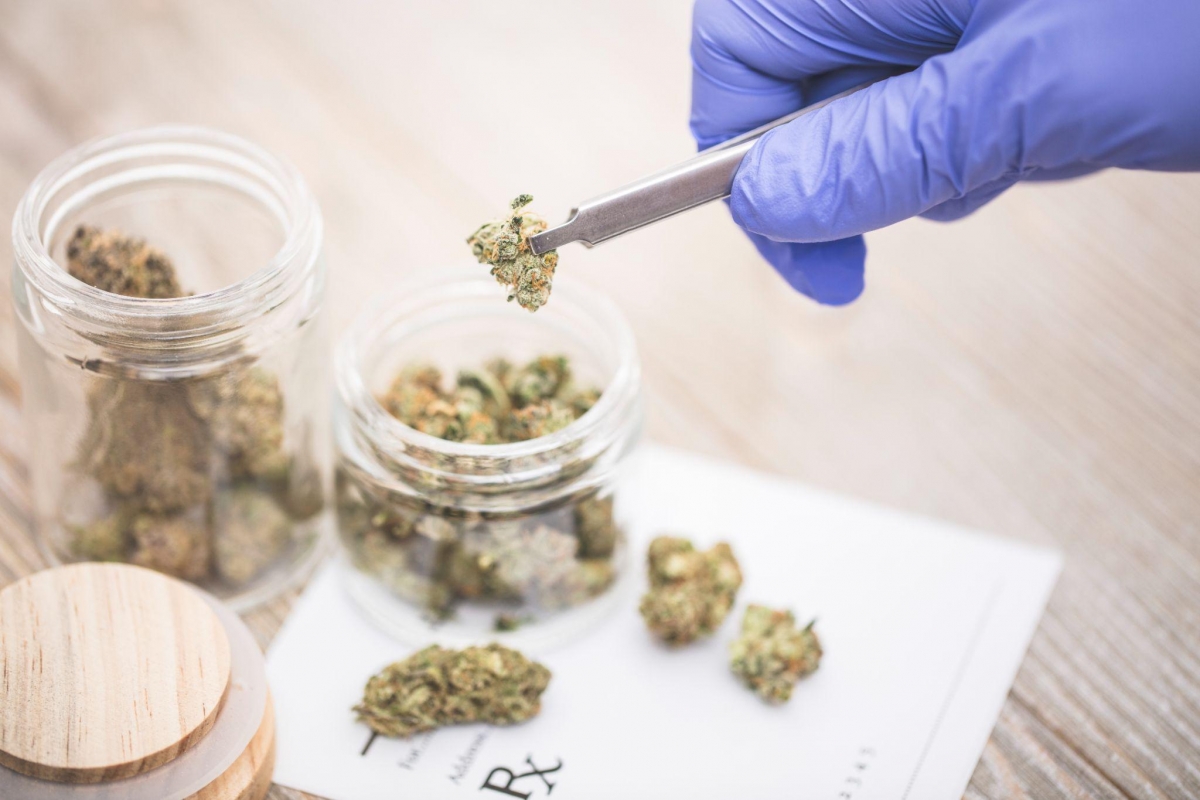In recent years cannabis has enjoyed widespread legalization for medical and recreational consumption, but it has been used for both purposes for centuries.
The cannabis plant consists of over 400 chemical compounds, including roughly a hundred cannabinoids (compounds that interact with the body’s endocannabinoid system, or ECS) as well as terpenes, flavonoids, and more.
When isolated, these compounds may offer a range of potential effects. For example, tetrahydrocannabinol (THC) produces psychoactive effects (a euphoric or high feeling), impacts mood, and relieves pain, among other things.
Cannabidiol (CBD) may ease inflammation, as well as feelings of anxiety or depression, with no psychoactive side effects. However, when these chemical compounds are combined, they become more than the sum of their parts, delivering an entourage effect that enhances overall results.
Growing legalization is opening the door to increasing research, resulting in a greater body of knowledge concerning the makeup of cannabis and what different chemical components can do. The outcome is that we now have a better understanding of some of the many health benefits cannabis provides.
Perhaps you’re interested in getting a medical marijuana card as a means of procuring alternatives to pharmaceutical drugs for a medical condition. Or maybe you simply want to know what benefits you might enjoy when consuming cannabis in a recreational capacity.
This article will look at a few things you should know about the potential mental and physical health benefits of cannabis.
Mental Health Benefits
Most people are familiar with the fact that cannabis creates feelings of euphoria due to the presence of THC.
However, it can have a much broader mental and emotional impact, whether you choose the full-spectrum benefits of marijuana or you skip the psychoactive effects by opting for hemp cannabis products that contain 0.3% or less THC (i.e., products legalized at the federal level by the 2018 Farm Bill).
While products containing THC can offer a wide range of potential benefits, some consumers may prefer to avoid the psychoactive effects of this particular cannabinoid.
The good news is that CBD shows promise where mental health is concerned. It may not be as potent as using CBD for physical effects like pain relief, but when it comes to the mental health benefits cannabis has to offer, you could opt for products with or without THC.
Again, the entourage effect is important to consider. Stripping products of hundreds of cannabinoids to isolate just one could decrease potency and limit the overall experience and benefits. With that being said, there are several possible benefits to be gained from choosing products with CBD, THC, or the full spectrum of cannabinoids.
Reducing Anxiety
You may be thinking that cannabis is notorious for causing paranoia, a type of anxious thinking. How, then, does it reduce anxiety? It all has to do with dosing and the chemical compounds present.
The ECS plays a role in processing stress and anxiety, insomuch as it tempers emotional responses to fear and stress stimuli, ensuring appropriate reactions to potential threats or stressors.
It works in concert with the dopamine system and hypothalamo-pituitary-adrenocortical axis to properly balance feelings of distress and well-being.
When certain cannabinoids interact with the ECS, they can impact anxiety levels in a variety of ways. THC notably seems to increase anxiety in high doses, but it may do just the opposite in lower doses, inducing a calm and relaxed state.
CBD appears to be better suited to easing anxiety, both in low and high doses, so hemp cannabis products may be preferable for those seeking purely mental health benefits.
Alleviating Depression
Depression can affect us all throughout our lives, particularly following stressful or traumatic events such as job loss, illness or injury, abuse, the loss of a loved one, and other incapacitating occurrences.
The condition could also be chronic, it could be linked to hormones, or it may be associated with prescription medications or drug or alcohol abuse. It could even be a symptom of changing seasons (as with seasonal affective disorder, or SAD).
According to the World Health Organization (WHO), an estimated 5% of the adult population suffers from depression. One of the potential mental health benefits cannabis could deliver is the relief of depression symptoms.
Depending on the strain, marijuana could offer stimulant or sedative effects, or both.
While studies seem to indicate that cannabis is neither a cure for nor a cause of depression, there is some evidence that the uplifting or relaxing effects of cannabis could reduce negative thoughts.
Patients suffering from depression who are opposed to pharmaceutical intervention may want to discuss the potential benefits of medical cannabis with their doctor.
PTSD Relief
Following the passage of the 2018 Farm Bill, several clinical trials, including one funded by The Department of Veterans Affairs (VA), were launched to determine the extent to which CBD could help alleviate debilitating symptoms of PTSD.
In particular, in the VA study, CBD was examined as a supplemental treatment with prolonged exposure therapy.
To date, much of the evidence related to the PTSD health benefits cannabis offers remain anecdotal, with research on the topic being somewhat inconclusive. However, recent studies suggest that cannabis could reduce trauma-related anxiety while also minimizing traumatic memories, both of which are frequent symptoms of PTSD.
Physical Benefits of Cannabis
Different strains of cannabis are known to deliver different effects. For example, sativa is associated with a euphoric head-high that uplifts mood and boosts energy and creativity. Indica, on the other hand, is linked to a relaxing body-high that delivers pain relief, improved sleep, and appetite stimulation.
Hybrid strains can offer a bit of both, depending on the mixture. When it comes to the physical benefits of cannabis, there’s more than anecdotal evidence these days.
Whether you’re interested in relieving pain symptoms, turning to cannabis for sleep to avoid the many side effects of pharmaceutical sleep aids, or you’re looking to lose weight, you might be surprised by the potential assistance cannabis could lend to your efforts.
Chronic Pain Relief
While CBD products seem better suited to mental health benefits, those relying on cannabis for pain relief may be better off turning to products that contain the full spectrum of cannabinoids, particularly THC.
There is some evidence to suggest that CBD could help with symptoms of pain and inflammation, but medical marijuana containing THC has generally proven more effective.
Studies have shown cannabis capable of relieving pain symptoms related to a wide range of diseases and health conditions, such as chronic migraines, cancer, AIDS, spastic disorders, and more.
Chronic pain, in particular, is often treated with opiates that can have a host of undesirable side effects, not the least of which are the development of tolerance and addiction.
What makes cannabis a potential alternative for pain relief? Because peripheral nerves that detect pain sensations feature ample cannabinoid receptors, pain signals can be disrupted or blocked when THC or other cannabinoids bind to them.
Improved Sleeping Habits
You know that certain strains of cannabis can have relaxing and sedative effects, but what does this mean in terms of using cannabis for sleep improvement? If pain symptoms or anxiety impact your sleep, reducing them could help improve slumber, for one thing.
In addition, certain cannabinoids could help to reduce arousal and produce sedative effects. Interestingly, THC seems to offer sedative effects at lower doses, while higher doses could have a stimulating effect, but CBD is just the opposite.
Weight Loss
When it comes to the physical benefits of cannabis, you might not immediately assume that weight loss would be on the list. After all, marijuana has a penchant for causing the munchies, so it is sometimes used to stimulate appetite.
There are a few things to consider here. First, the potential for snack attacks will depend somewhat on the strain you choose. Certain strains are more likely to increase feelings of hunger.
Second, people who are specifically seeking strains that boost appetite may be doing so because they have a condition that impacts normal hunger signals or causes weight loss.
How can cannabis help you lose weight? For people suffering the pain of inflammation that limits mobility, cannabis could provide relief that allows for increased mobility and exercise, which can, in turn, aid in weight loss. You could also use it to ease stress and anxiety, both of which could be responsible for overeating as a comfort response.
Sleep is an essential component in maintaining or losing weight, as adequate rest is necessary to regulate the hunger and satiety hormones ghrelin and leptin. If cannabis improves sleep habits, it could have the secondary effect of aiding in weight loss or at least helping to prevent weight gain.
Finally, cannabis interacts with CB1 receptors, which are linked to metabolic function. A study on BMI and obesity suggests that cannabis could reduce energy storage and increase metabolic rates in high enough levels, potentially leading to weight loss.
Who Can Benefit from Cannabis for Mental and Physical Health?
When it comes to using cannabis for pain, anxiety, or other mental and physical conditions, you’ll have to decide what’s right for you. Speaking with a trusted doctor and conducting your own research is a good place to start.
While legalized cannabis is still relatively new, and further study needs to be conducted in many areas to understand the full benefits of cannabis when it comes to addressing a wide range of symptoms and conditions, there is a growing body of evidence suggesting incredible health benefits of marijuana and hemp cannabis alike.
Whether you have a medical marijuana card for the state of Colorado or you’re looking to enjoy some of the health benefits cannabis can offer through recreational purchases, you’ll find the premium products and competitive prices you seek at Denver Dispensary.
Simply browse our medical or recreational menus online or contact us with any questions you may have.


